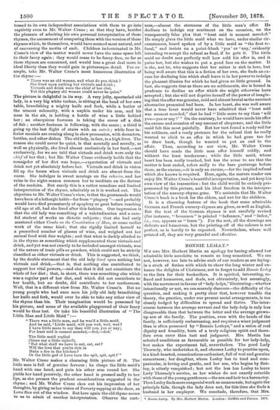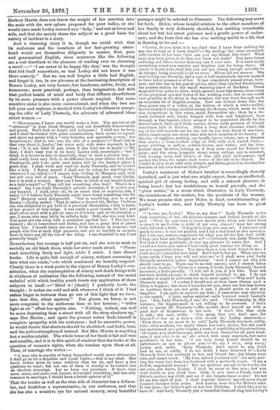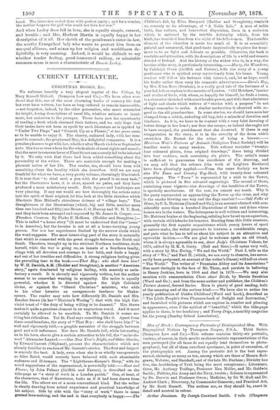BONNIE LESLEY.*
WE owe Mrs. Herbert Martin an apology for having allowed her admirable little novelette to remain so long unnoticed. We are not, however, too late to advise such of our readers as are laying- in a stock of fiction with which to cheer the long winter and en- hance the delights of Christmas, not to forget to add Bonnie Lesley to the lists for their booksellers. It is spirited, interesting, re- fined and humorous, and deals, not obtrusively, but amusingly, with the movement in favour of "lady-helps," illustrating—whether intentionally or not, we can scarcely discover—the difficulty of the question, and making it pretty clear that, however tenable the theory, the practice, under our present social arrangements, is too closely hedged by difficulties to spread and thrive. The inter- course between the average servant and the lady-help is only less disagreeable than that between the latter and the average grown- up son of the family. The position, even with the heads of the family, is sufficiently embarrassing, and requires a wiser judgment than is often possessed by "Bonnie Lesleya," and a union of real dignity and humility, born of a truly religious spirit and there- fore even rarer than tact and judgment. Mrs. Martin has selected conditions as favourable as possible for her lady-help, but makes the experiment fail, nevertheless. The good Lady Thornely, who undertakes it, and chooses Lesley to practise upon, is a kind-hearted, conscientious enthusiast, full of real and genuine earnestness ; her daughter, whom Lesley has to tend and corn- panionise, is loving and gentle, and her son, who begins by flirt- ing, is utterly vanquished ; but not the less has Lesley to leave Lady Thornely's service, as her wishes do not exactly coincide with those of the young gentleman—the son and heir to a baronetcy. Then Lesley finds more congenial work as amanuensis, but again the principle fails, though the lady does not, for this time she finds a husband in her employer. We conclude, therefore, that Mrs.
* Bennie Lesley. By Mrs. Herbert Martin. London : Griffith and Ferran. 1878.
Herbert Martin does not throw the -weight of her sanction into the scale with the new sphere proposed for poor ladies, or she would have made Lesley succeed as a " help," and not as lover and wife, and that she merely chose the subject as a good basis for variety of incident in a story.
And a charming story it is, though we could wish that its authoress and the members of her fast-growing sister- hood would set themselves diligently to master, first, pure and grammatical English, since sentences like the following are a real drawback to the pleasure of reading ever so charming a novel :—" I am never to be happy like that,' was the thought that hid itself somewhere, so that Lesley did not know it was there scarcely." But we can well forgive a little bad English, and forget it, too, in our pleasure at the fascinating description of Bonnie Lesley, not only bonnie, but handsome, active, lively, and humorous ; more practical, perhaps, than imaginative, but with that perfect health of mind and body that diffuses cheerfulness by its mere presence with a power almost magical. Her more sensitive sister is also more conventional, and when the two are left poor and orphans, is shocked with Lesley's boldness in accept- ing the offer of Lady Thornely, the advocate of advanced ideas about women :— "'Mavourneen, I knew you would make a fuss. You are not at all " advanced " in your ideas, Margery, and are dreadfully Conservative and proud. Don't look so tragic and indignant ! I shall not be here, and I shall be treated with great consideration, have rooms to myself, and share my meals with a "very ladylike and agreeable person," the housekeeper, that is, who was the wife of a surgeon.'—' Don't talk in that way about it, Lesley,' her sister said, with some reproach in her tone ; it is not kind of you, when it has hurt me so much.'—' My dear, I don't want you to be hurt,' Leaky said, caressingly ; but I think it is better to take it cheerfully, than in such a gloomy way. I shall really have very little to do different from your duties with Lady Pennington, only I am quite sure yours will be the hardest place, a great deal. I shall write and read for Lady Thornely, and be treated like a lady. I flatter myself I shall not be taken for anything olsa, whatever I am called.'—' I cannot help feeling it,' Margery said, with her soft eyes full of tears. 'Lady Thornely may mean very kindly, but it is such a wrench. How can I bear to think of my bonnie Lesley as a lady's-maid?'—' Then call her something else, dear! What's in a name? Say I am Lady Thornely's private secretary, if it makes you any happier. I shall, after all, be as much that as anything else, I fancy.'—' I believe Lady Thornely might have found something else for you!' Margery cried indignantly. ' She is sacrificing you to a pet theory.'—Lesley smiled. 'That is rather a shrewd hit, Madge. I believe she was delighted to get hold of a practical illustration, ready to hand, of her project of lady-helps. I was really a good chance for her ; you don't often meet with a girl at onto so destitute and so ill-educated,- one, I mean, who may fairly be called a lady. Still, she was very kind. You must not run away with a prejudice against her. I like her ex- tremely; she is benevolent and clover, and has a great deal of power about her. I should fancy she was a little deficient in humour ; but people who live at such high pressure, and are so terribly in earnest, have to leave out all the fun of the thing. I am thankful to say I can generally laugh.'" Nevertheless, her courage is half put on, and she sets to work to -revivify an old black dress, while her sister reads aloud. " Please read something lively and light, while I stitch. I hate dismal books. Life is quite full enough of misery, without cramming it into what one reads,"—to which sentiment we heartily respond. Clearly there is a weak point in the vigour of Bonny Lesley's con- stitution, when the contemplation of misery and death brings with it vividness of realisation like the following, instead of the moral unbelief with which healthy youth treats any application of these subjects to itself :—" Mind it ! [death] I perfectly loathe the thought ; it makes me cold and sick whenever I think of it. I had rather linger in tortures than go out of this light that we know, into that dim, silent mystery." But gloom, we fancy, is not more congenial to the authoress than to her heroine ; " trifles light as air " affect her spirits also. " Nothing, indeed, can well be more depressing than a street with all the shop-abutters up," says Mrs. Martin ; and again the present writer finds himself in complete sympathy with his authoress ; had he executive power, he would decree that shutters should be abolished, and bolts, bars, and the police strengthened instead. But Mrs. Martin is anything but a sentimentalist. The whole tenor of her book is fair and wise and sensible, and it is in this spirit of candour that she looks at the question of women's rights, when she touches upon them at all. Thus, of marriage she writes :- "A man who is capable of being henpecked would never attract me. I shall go in for a Republic and equal rights,—that is my ideal. Men know rather more on some subjects than we do, and have a few qualities we want ; but not one of them is worthy to be turned into an absolute sovereign. Let us keep our province. If there were more sense, and more real, honest, downright friendship, and less silly romance in marriage, I should have a better opinion of it."
That the tender as well as the wise side of character has a delinea- tor, and doubtless a representative, in our authoress, and that she has also a sensitive eye for natural scenery, many beautiful
passages might be selected to illustrate. The following may serve for both. Helen, whose invalid relation to the other members of her family is very delicately sketched, has nothing remarkable about her but her sweet patience and a gentle power of endur- ance, and she fears that she has done nothing useful in a life that is drawing to its end :— " Lesley, do you think it is my fault that I have done nothing for any one as long as I have lived ?'—' My darling,' the other answered, with fervour in her tone, how can you say things like that ? What have you been given to do that you have not done ? You have borne suffering and illness bolter than any one I ever saw. You have made everything round you sweeter and brighter just for being there. Of course it is not your fault that you are not strong enough actually to do things; being yourself, is all we want.' Helen did not answer. She was looking out dreamily, and a sort of half-melancholy reverie seemed to have taken possession of her. It had completely passed away, how- ever, and she was in her gayest spirits, when they reached Dorminster, the nearest station for the small watering-place of Rockbay. There were still four miles to drive, which scorned more like seven, on account of the perpetual ups and downs of the winding road; but no one could ever grumble at the drive in fine weather, the way wont through such an exquisite bit of English scenery. Now one looked down into the deep green cup of a valley, at the bottom of which a white-walled, brown-thatched cottage nestled among the flowers, which seem to run riot everywhere in this warm, moist Devonshire air ; then by a fir- wood, bordered with banks fringed with fern and foxgloves; hero through a tiny hamlet, which seemed to bo populated chiefly by the brown-haired, dark-eyed little rustics, whose early promise of beauty sometimes fails in fruition. After a long, slow, tiresome climb, the top of the bill rewards one for the toil by the first burst of sea-view, which comes upon one every time with fresh surprise at its beauty. A dim lino of sapphire, melting, one hardly knows where, into a dimmer blue above ; a foam-washed ridge of cliff, with rich, varied tints,— greys yielding to yellow, reddish-brown, and white ; and for fore- ground more fir-trees, looking as if they were posed for Turner to paint ; and the steep, irregular street,-every cottage gay in summer, with creamy roses and bushes of blue and pink hydrangeas ; and against the blue, the square dark tower of the old stone church. No wonder Lesley went wild with delight, and Helen gloried in the familiar beauties of her own beloved little place."
Lesley's treatment of Helen's brother is exceedingly cleverly described, and is just what one might expect, from an unaffected, spirited girl of strong feeling, and with a natural pleasure in being loved ; but her truthfulness to herself prevails, and she "gives notice," in a scene which illustrates, in Lady Thornely, the touchiness of the mother, but the goodness of the woman. We must premise that poor Helen is dead, notwithstanding all Lesley's tender care, and Lady Thornely has been in great grief :-
"' Leave me, Lesley ! Why so, my dear ? ' Lady Thornoly spoke with something of her old decisive manner, and looked keenly at the girl. What do you want to leave me for now, when you have been so much to me ?—like a child of my own, almost ;' bore her strong voice faltered a little. 'I hoped to keep you near me. I have not said much to you ; it was too painful. and I am a bad hand at fine speeches. But I am not, indeed, ungrateful for what you did for that dear child. I hope you have not thought me so ?'—' Certainly not, Lady Thornely. Not that I want gratitude; it was my pleasure to serve her. And I would not leave you unless I bad really good reasons for doing so. I am not ungrateful either. You have been a very kind friend to me ; I shall always remember how kind. But I had better go. When you are home again, I hope you will not miss me.'—' I shall miss you,' Lady Thornely answered, rather imperiously. And I cannot see why you should want to go. There can be no real reason ; and I cannot fancy you fickle, Lesley.'—' There is a reason, I think, Lady Thornely,' Lesley
answered, a little proudly. I will tell it you, if you like. Your son has been foolish enough to think himself attached to me. I do not consider it would be advisable for us to moot again.'—' Why not?' Lady Thornoly urged. I confess I should not, at first, have chosen such a thing to happen; but since I have known you, since our lose has drawn us together, there are few girls, if any, I should prefer to call my daughter. I am quite in earnest, my dear ; I cannot see any objection to the match.' A faint, rather satirical smile hovered round Lesley's
lips. ' But, Lady Thornely, I can,' she said. Unfortunately, in this instance, the beggar-maid is not willing to be crowned. I don't wish to marry Mr. Thornely:—His mother drew herself up with a good deal of displeasure in her look. 'I don't like that style of talk,' she said, stiffly. 'You mean that you don't oaro for Lionel ?'—' Not as a chosen wife should do,' Lesley answered.— 'Then there is no more to bo said,' Lady Thornely rejoined, coldly. Like other mothers, she might blame her son's choice, but she could not understand, nor quite forgive, a want of sensibility to his attractions. Of course you shall leave me, with my boat thanks for all your kind- ness, if you wish to do so,' she added, with some reproach, but more gentleness in her tone. ' I am very sorry Lionel should be so unfortunate as not to please you.'—' So am I very, very sorry,' Lesley said, sadly. 'Lady Thornely, don't speak to me, don't look at me, so coldly. I do not think I have deserved it.'—Lady Thornely drew her suddenly to her, and kissed her; her kisses were rare, and meant much. My love, indeed you have not !' she said, put- ting the wavy hair from her forehead with a motherly touch. I am a foolish, ungrateful woman ! But we mothers are apt to be touchy for our sons, you know, Lesley. I shall be sorry to lose you ; but you shall decide as you think best. Only, if you want a friend, come to Helen's mother, my child, and see if she forgets these weeks! Do not let mo lose sight of you. I shall scarcely interest myself more about Connie's fortunes than yours. And Lesley, wear this for Helen's sake. It was hers ; her father's gift on her last birthday. I shall like you to have it.' And Lady Thornely put a beautiful diamond ring into Lesley's band. The interview ended thus with perfect amity; and fora wonder, the mother forgave the girl who could not love her son."
And when Lesley does fall in love, she is equally simple. earnest, and lovable ; and Mrs. Herbert Martin is equally happy in her description of it all. Her sketch of the gentleman's sister-in-law, the worthy Evangelical lady who wants to protect him from an unequal alliance, and mixes up her religion and worldliness de- lightfully, is very amusing. Indeed, it would be difficult to say whether tender feeling, good-humoured raillery, or admirable common-sense is most a characteristic of Bonnie Lesley.




































 Previous page
Previous page